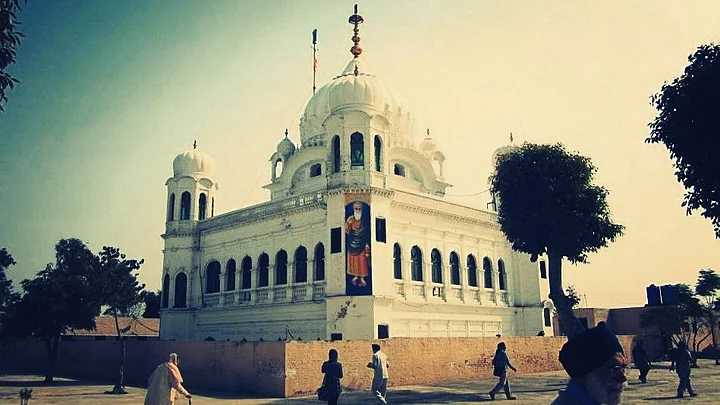Even in the midst of tensions between New Delhi and Islamabad, certain links do remain intact – such as religious pilgrimages by the Sikhs to their holy shrines in Pakistan (of course, if relations were harmonious the number of pilgrims visiting Pakistan would be higher).
The Pakistani High Commission in New Delhi recently issued 3,800 visas for Sikh pilgrims wanting to visit Pakistan to pay obeisance at Sikh shrines on the birth anniversary of Guru Nanak Dev (the first Guru of the Sikhs) which happens to be on 23 November. A statement issued by the Pakistan High Commission highlighted the fact, that this is the largest number of visas issued in recent years to Sikh pilgrims.
Sidhu’s Infamous ‘Hug’, & Kartarpur Corridor Demand
In 2019, Sikhs around the world will be commemorating the 550th birth anniversary of Guru Nanak Dev. The Government of India as well as the Government of Punjab (India) have already listed some of the steps they are likely to take for commemoration (this includes a series of seminars, setting up of chairs at universities)
Too busy to read? Listen to it instead.
One of the key issues which Sikhs have been raising for a while (almost for two decades) is that of the Kartarpur religious corridor. This corridor seeks to connect Dera Baba Nanak (India) with Darbar Sahib, Narowal (Kartapur Sahib).
Both sides are at a distance of less than 5 kilometres from each other. Through this corridor, Sikhs will get visa-free access to the historic shrine, and will save them the hassle of travelling all the way to Delhi to secure a visa.
During cricketer-turned-politician Navjot Singh Sidhu’s visit to Pakistan, the issue of the religious corridor came to light, after Sidhu hugged Army Chief Qamar Javed Bajwa at Prime Minister Imran Khan’s oath-taking ceremony.
While Sidhu’s move to embrace Bajwa was criticised by many in India, including his own party men, he cited the commitment given by Pakistan’s army chief towards opening the religious corridor. This did not spare Sidhu from attacks, with many arguing that he had gone in his personal capacity, and being a minister in the Punjab government, he was in no position to raise the issue.
Only India-Pak Dialogue Can Take Kartarpur Demand Forward
In September 2018, a member of Imran’s Cabinet, Fawad Chaudhry again stated, that irrespective of ties between both countries, Pakistan would open the religious corridor, since it is an issue which pertains to ordinary Sikhs. Later on, as tensions have increased due to repeated militant attacks in Kashmir, as well as the cancellation of talks between Foreign Ministers of India and Pakistan (on the sidelines of the UNGA), Islamabad stated, that the corridor could only go ahead, if talks were held between both sides.
Will not see any forward movement if India does not hold talks with Pakistan.Pakistan’s Foreign Ministry spokesperson Mohammad Faisal
The Government of India on its part, first stated that this corridor could only go ahead, if a formal request came from Pakistan, though sections of the security establishment have repeatedly put forward their apprehensions. Even when it seemed that the movement had got a fillip, a media report underscored the concerns of intelligence agencies and the army.
In 2018, the Indian Parliament’s Standing Committee on External Affairs too had expressed its reservations with regard to the corridor.
Congress Member of Parliament Shashi Tharoor, during a visit to the Indian side of the border, stated, “Under the current political scenario, where Pakistani agencies are regularly beheading Indian soldiers, we cannot even think of taking such an initiative.”
Pressure from Sikh Activists
In spite of a less than enthusiastic New Delhi and an ambivalent Islamabad, activists on the Indian side as well as from the Punjab (Pakistan) Government have continued to raise demands for the religious corridor.
In a letter to Indian Foreign Minister Sushma Swaraj, Chief Minister of Punjab (India) Captain Amarinder Singh raised the issue, stating that this was of concern to Sikhs. He again took up the issue with the Ministry of External Affairs in November 2018. The Ministry of External Affairs responded by stating that it could not do anything, until it received a formal communication from the Pakistani side.
A recent terror attack in the border town of Amritsar, where two men on motorcycles forced their way into a weekly congregation of the Nirankari sect and lobbed a grenade killing two people, has further dashed hopes of the corridor, since the attackers have allegedly received support from the ISI.
The Government of India recently stated, that it would install a high powered telescope and a screen on the Indian side for a view of the Kartarpur shrine for the benefit of the pilgrims. There was no mention about the issue of the religious corridor.
The only hope for the religious corridor is resumption of dialogue between India and Pakistan post 2019 general elections, and continuous pressure from activists in India and overseas.
Guru Nanak’s Message of Peace Lost Amid Row
Tensions between both countries have always proven to be an obstacle in people to people linkages between both countries in general, and the two Punjabs in particular; this time it is the Kartarpur Corridor.
It is a pity, considering Guru Nanak’s universal message of peace and co-existence. It is also sad, that most Sikhs who want to visit Kartarpur Sahib where the first Guru spent an important phase of his life, are far removed from the politics of the nation-states.
(Tridivesh Singh Maini is a New Delhi based Policy Analyst associated with The Jindal School of International Affairs, OP Jindal Global University, Sonipat. He tweets at @tridiveshsingh. This is an opinion piece and the views expressed above are the author’s own. The Quint neither endorses nor is responsible for them.)
(At The Quint, we question everything. Play an active role in shaping our journalism by becoming a member today.)
